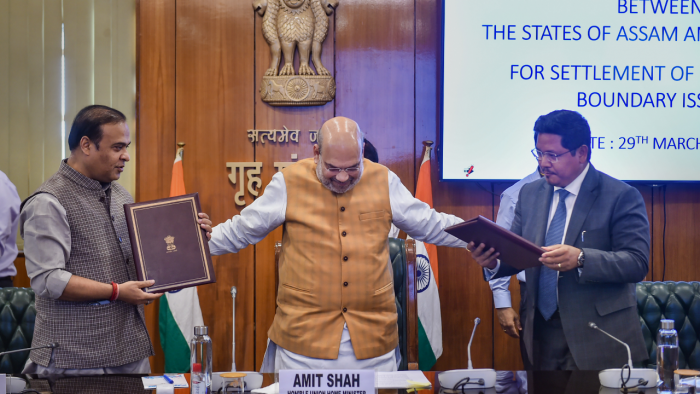
Whose land? Tribal bodies challenge Assam-Meghalaya border pact
Boundary disputes are difficult to solve in the N-E due to a complex land holding system based on customary laws in the tribal states. The government owns no land and hence it has no right to transfer it to any other entity and any such attempt will have no locus standi, said legal experts

Barely over a month after Assam and Meghalaya signed an agreement to resolve the five-decade-old boundary disputes between them, the deal is under challenge due to the existing special land ownership system in the tribal state.
In the north-eastern states of Meghalaya, Mizoram, Nagaland and Arunachal Pradesh – tribal states with which Assam has protracted boundary disputes – all the land barring a few pockets are owned by community and not the government.
As such, tribal bodies and some legal experts are of the view that the governments of these states have no right to decide the fate of the land they do not own.
Legality of agreement
The Khasi Hills Autonomous District Council (KHADC) and Durbar of Khlieh Nongsynshar Raid Mylliem Syiemship (DKNRMS), a body of traditional elected heads of villages, questioned the legality of the agreement.
The KHADC is preparing to file a petition in the court challenging the memorandum of understanding signed between the Assam and Meghalaya governments on March 29, to partially resolve disputes along their 884.9-kilometre boundary.
As per the terms of the agreement signed between the CMs of the two states in the presence of Union home minister Amit Shah, Assam will get 18.51 sq. km of the 36.79 sq. km disputed area, while Meghalaya will get the remaining 18.28 sq. km.
Also read: Assam, Meghalaya agree to resolve 50-year-old boundary dispute
Jambo War, an executive member of the KHADC, said the council will move the court against the MoU as the state government has decided to transfer land under the jurisdiction of five Himas (traditional village institutions) to Assam.
Consent of communities
Shillong-based lawyer Erwin Sutnga said unless the stakeholders, i.e., the communities living in the areas that the Meghalaya government proposed to hand over to Assam, are made part of the agreement, the MoU has no validity.
“Can I sell or transfer your land to anyone else. How can the government do it when it does not own the land?” he asked.
“In Assam, the government owns the land and so it can do whatever it likes under the provision of the law. Maybe, it will have to give some compensation to the affected people. But, here in Meghalaya, the scenario is completely different. The government owns no land and hence it has no right to transfer it to any other entity. Any such attempt will be totally against the tribal administrative system and legally will have no locus standi,” Sutnga explained.
He said a similar issue would also arise if the government of other tribal states in the region try to transfer land to Assam to settle the disputes without the consent of the traditional tribal institutions that own the community land.
Hafiz Rashid Choudhury, former chairman of the Bar Council of Assam, Nagaland, Mizoram, Arunachal Pradesh and Sikkim, agreed that this legal issue would crop up during the transfer of land. “The governments can sign MoUs. But their execution will not be legally possible unless the respective traditional tribal village institutions give the nod,” he said.
Aizawl-based lawyer Rosalyn Hmar is also of the same view. The governments of these tribal states would not be able to push any land deal without the “consent of the society at large,” Hmar feels.
More border disputes
The Assam government is currently holding discussions with Arunachal Pradesh and Mizoram governments to settle the border disputes.
A case over the state’s border dispute with Nagaland is now pending in the Supreme Court. The Assam government had moved the apex court in 1988. Recently, Nagaland Chief Minister Neiphiu Rio said his government was willing for an out-of-court settlement.
Union home minister Amit Shah last year had set a target to resolve all the boundary disputes in the region by August this year.
Choudhury said it would be easier said than done due to the complex land holding system based on customary laws in the tribal states.

